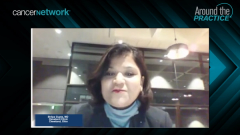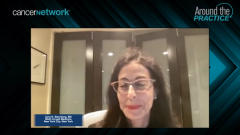
Selecting Frontline Therapy for Metastatic Urothelial Carcinoma
Reviewing a patient case of metastatic urothelial carcinoma, experts discuss the selection of frontline and maintenance therapy.
Episodes in this series

Transcript:
Peter H. O’Donnell, MD, PhD: Good evening, everybody. Welcome to this Cancer Network®Presentation entitled “Around the Practice: Advanced Urothelial Carcinoma.” I’m your moderator for tonight. I’m Peter O’Donnell, I’m a medical oncologist at the University of Chicago and joining me today is our esteemed panel. We have Dr Matthew Campbell, Dr Shilpa Gupta, and Dr Cora Sternberg. I’d like to ask each of them in turn to introduce themselves. Let’s start with Cora, could you please introduce yourself?
Cora N. Sternberg, MD: Hello. It’s a pleasure to be here. My name is Cora Sternberg. I’m a medical oncologist who specialized in genitourinary oncology for quite some time now. I’m currently the clinical director at the Englander Institute for Precision Medicine at Weill Cornell Medicine in New York Hospital.
Peter H. O’Donnell, MD, PhD: Thank you. Shilpa?
Shilpa Gupta, MD: Thanks Peter. It is a pleasure to be on this panel with all of you. I’m a medical oncologist specializing in GU [genitourinary] cancers at the Cleveland Clinic in Cleveland, Ohio.
Peter H. O’Donnell, MD, PhD: Great. Thank you. Matt?
Matthew T. Campbell, MD, MS: Yes, thank you. It’s a pleasure to be here. My name is Matt Campbell. I’m a GU oncologist in [The University of Texas MD] Anderson Cancer Center down in Houston, Texas.
Peter H. O’Donnell, MD, PhD: All right. It’s really great to be able to spend the next hour with each of you. Tonight, as you know, we’re going to discuss the treatment landscape for locally advanced metastatic urothelial cancer. As we all know, a lot of changes in this area recently. It’s really an exciting time actually to be treating bladder cancer. We’re going to focus on the first-line setting for the most part and the idea of maintenance therapy, which clearly has been one of the major paradigm changes over the past year or so. We’re going to review 2 patient cases. We’re going to involve our audience that’s with us tonight by using an interactive online platform. We’ll have several polling questions scattered throughout the course of the evening that we’ll have responses to and then we’ll have a discussion by our panelists around each of those questions. Why don’t we go ahead and begin? If we can advance to our first case of thenight; probably a patient that many of us have seen in our practice. This is a 68-year-old man who has metastatic urothelial carcinoma of the lymph nodes and the lungs. You’ve done PD-L1 [programmed death-ligand 1] testing on 1 of the metastatic sites and he’s a high expresser of PD-L1. The patient’s creatinine clearance is 65 but his ECOG [Eastern Cooperative Oncology Group] performance status is 2. All right, we’re going to do the first audience poll of the night about this patient. The first polling question is shown here on this slide. It’s simple or straightforward at least. Maybe not a simple answer but how would you treat this patient? Would you use gemcitabine with cisplatin? Would you use gemcitabine with carboplatin, pembrolizumab [Keytruda]? Or would you use gemcitabine/paclitaxel? Please choose 1.
All right, and I’m seeing the results coming in now. OK, great. So it looks like we’ve got about 18% of the audience picking gemcitabine with cisplatin in this patient. Almost half of the audience picked gemcitabine with carboplatin . Then another almost half of the audience picked pembrolizumab. And nobody picked gemcitabine with paclitaxel. All right, excellent.
We’ve got a patient with lymph node and lung metastatic disease, PD-L1 high, ECOG 2, creatinine is just above our normal here. Shilpa, can you start us off? How would you think about this patient’s treatment?
Shilpa Gupta, MD: Thanks, Peter.For this patient who has ECOG performance status of 2, I would be hesitant to give cisplatin although the creatinine clearance is pretty good. Gemcitabine with carboplatin followed by avelumab [Bavencio] maintenance would be my preferred approach based on the data we saw from the JAVELIN Bladder 100 trial. Although, some might argue that pembrolizumab might be a reasonable option as well, but I would prefer platinums followed by avelumab maintenance.
Peter H. O’Donnell, MD, PhD: If I can ask a follow up of you Shilpa, is there 1 factor that’s pushing you more towards using the platinum maybe? What about the JAVELIN data is so convincing to you?
Shilpa Gupta, MD: I think the improvement in overall survival by 7 months for patients who do not progress after platinum use. It’s pretty good and also based on the phase 3 KEYNOTE-361 trial where even high PD-L1 tumor patients with high PD-L1 expressing tumors had lesser response rates compared to carboplatin, although this comparison may not be direct. I think just makes a more convincing argument to use platinums when possible and if this patient had other issues or was refusing platinums then certainly pembrolizumab would be the treatment to go with.
Peter H. O’Donnell, MD, PhD: Cora, do you mind chiming in? How would you feel about this patient’s treatment?
Cora N. Sternberg, MD: Well, first of all, when ECOG performance status is something that is in the mind of the physician and the doctor, you really need to see the patient to understand why is this—is this really an ECOG performance status 2 or not? Because for me the creatinine clearance of 65 is not too bad. If it was possible in a 68-year-old man, I would feel much better giving him something like gemcitabine and cisplatin, perhaps on a split dose Day 1/Day 8 dose, and then follow with avelumab maintenance based on the JAVELIN 100 trial. I would really try to consider that. I would have to really understand why this patient has a PS [performance status] of 2 and if that’s really true. Otherwise, I would agree with everything that’s been said. It’s my only little hesitancy there.
Peter H. O’Donnell, MD, PhD:Great. You’re making an interesting point that maybe unlike some of the other cancers where cisplatin and carboplatin might be interchangeable, you really feel that cisplatin has a big advantage in bladder cancer?
Cora N. Sternberg, MD: I really think that cisplatin has a huge advantage in bladder cancer and I’ve never seen anybody anywhere near cured with carboplatin. I don’t like to use it in the new adjuvant setting. I barely use it in the adjuvant setting.
Peter H. O’Donnell, MD, PhD: That’s a great point. Matt, could you make an argument here for pembrolizumab in this patient? I know that maybe that’s not your choice but half the audience thought maybe.
Matthew T. Campbell, MD, MS: I think the argument is, this is a PDL high. I completely agree that it’s not a biomarker to use. But you figure this is, at least I would hope it would be as close to a status that you can achieve. I hear the same concerns. I am not a fan of carboplatin and if I felt that a patient could tolerate cisplatin I would consider giving pembrolizumab. I think that the argument around that if you do get a patient who is in that lucky group of about 25% to 40% with the subgroup PD-L1 high, you can achieve a response. I’d be much more concerned if this patient had liver or bone metastasis. I think lymph node and lung, unless the patient had declined very quickly, I think you have a little bit of room in these patients to give immunotherapy a chance.
Transcript edited for clarity.
Newsletter
Stay up to date on recent advances in the multidisciplinary approach to cancer.










































